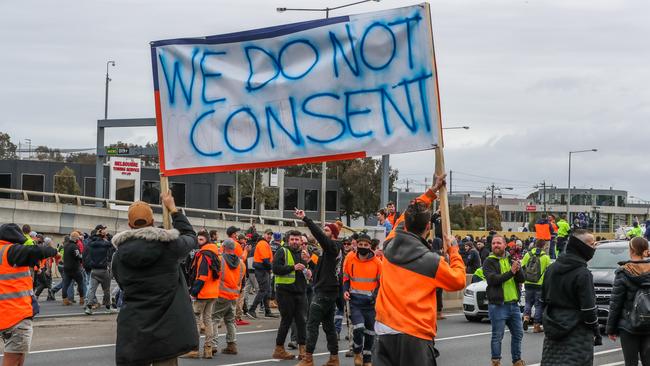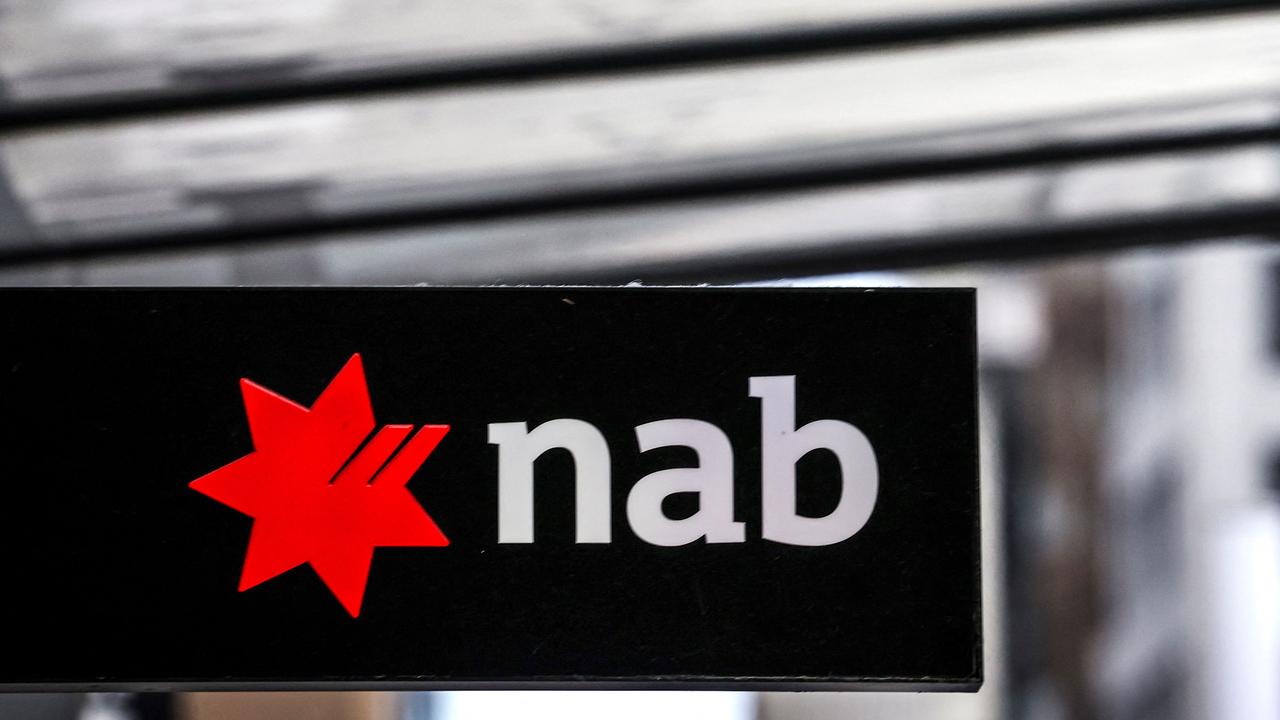Government must provide leadership on compulsory Covid jabs, KPMG survey reveals
Most businesses support mandatory Covid-19 vaccinations but a hesitating introducing their own policies in absence of a clear government directive.

Mid-tier businesses are looking to the federal government to issue public health orders around mandatory Covid-19 vaccination, as they anxiously watch the fallout of violent protests that have gripped Melbourne this week.
A survey from accounting firm KPMG of mid-sized businesses has revealed most support compulsory jabs but are unlikely to implement their own vaccine programs and policies without clear direction from the government.
Mandatory vaccinations have become an industrial battlefield, with construction workers over-running Melbourne’s Shrine of Remembrance on Wednesday, prompting riot police to fire rubber bullets and tear gas to clear the illegal mob from the site.
The protesters were rallying against mandatory vaccinations on construction sites, and followed a shutdown of the sector for two weeks over widespread non-compliance of Covid protocols and violent protest outside the CFMEU office on Monday. It is this strong reaction that has made smaller businesses fearful of following Qantas, Telstra, SPC and Healthscope in introducing compulsory jabs without a clear direction from government.
“Businesses, especially in the mid market and probably also the larger end of town … have very much become accustomed to following public health orders and government guidelines. So, if there were a guideline like that, they would probably also be more willing to mandate it for their own workforce,” KPMG Australia partner Kristina Kipper said.
The KPMG survey revealed that 56 per cent of mid-sized businesses supported mandatory vaccinations. But more than two-thirds of those that were against compulsory immunisation “strongly disagreed” with such policies.
Ms Kipper said this was unique in such pulse surveys, which normally generated more middle ground-centred response.
“When they were in favour, they were strongly in favour and when they were not, they were actually strongly not in favour. In ordinary surveys you see less of that polarisation,” she said.
“It is really important for the government to be very clear on what it takes and to be reviewing constantly what the guidelines should be. And therefore have more consistency in the business world, in the business community around mandating versus not.”
Indeed, even bigger companies, like the Australian arm of Fonterra, the world’s biggest dairy exporter, will only mandate vaccinations for staff if there is a government directive.
“We are following the government policy, the whole way,” Fonterra Australia managing director René Dedoncker said.
“We are not mandating, we are highly recommending. We all know that to play a role in the community. We need to be good corporate citizens both as mums and dads and people, and those that we work for … and we will continue to line up with government policy, as they adjust, but it’s working for us.”
Scott Morrison has so far ruled out making Covid-19 vaccinations compulsory, instead allowing businesses to create their own policies. But many have hesitated, citing the nation’s industrial framework.
And mandatory jabs have polarised unions. While the Victorian branch of the teachers union supported the state government mandating Covid jabs for all teachers and childcare workers, a coalition of building unions, including the CFMEU, Electrical Trades Union and Australian Manufacturing Workers Union and Plumbers Union on Monday accused the government of a “heavy handed” approach to mandatory vaccination in their sector.
But most of the 165 mid-sized companies that KPMG surveyed backed vaccination as the prime tool to combat the pandemic.
This raises the prospect of introducing vaccine passports to encourage greater take-up of Covid jabs by allowing certain freedoms for the immunised. While some commentators, including former Queensland premier Campbell Newman, say vaccine passports will lead to Jim Crow-style segregation, 82 per cent of businesses surveyed supported such a move.
“I think the business leaders think that it’s our collective way out of pandemic – vaccination and the passports,” Ms Kipper said. “But … they’re also motivated by keeping themselves and their families and their workforce safe as well as that desire for freedoms.
“There’s been too much of this stop, start (lockdowns). The biggest frustration is the stop-start and the uncertainty, and so that’s why there’s such overwhelming support for vaccine passports in this segment.”
But Ms Kipper said the government must ensure confidence around the use of vaccine passports before introducing such a policy to ensure its success.
The technology most also be robust and consistent, and not a repeat of Victoria’s initial check-in apps, involving businesses choosing from a smorgasbord of providers before the state government followed NSW in mandating the use of its one QR code-based platform.
“The sentiment and the feedback we’re getting is that you have the right technology to give the confidence to actually make it work. It needs to be supported by secure and safe technology,” Ms Kipper said.
“The last thing that we want to see is that if we don’t have the right technology and if the confidence drops on the passports actually being effective, then we may just see another setback.”
While support was high for vaccine passports, 65 per cent of survey respondents believed it was unlikely that their company would force staff working onsite to be vaccinated. “Here again, there’s a difference between requiring vaccinations for travel versus vaccinations in the workplace,” Ms Kipper said.



